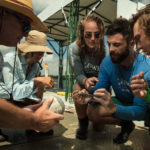Cooperative education benefits UWF students in a variety of ways
The UWF Cooperative Education program offers students an attractive package: Learn more about a chosen career, earn credit hours and get paid -- all at the same time.
The UWF Cooperative Education program offers students an attractive package: Learn more about a chosen career, earn credit hours and get paid — all at the same time.
“An experience in cooperative education benefits a student in a multitude of ways,” said Patrice Friant, who supervises the program and works with employers to develop employment opportunities and assists students in finding those opportunities. The benefits include learning about organizational hierarchies; workplace dynamics; and balancing work-life-school issues and employer expectations such as meeting deadlines, arriving at work on time and being ready to do the job. And, of course, these students have the opportunity to put the knowledge they’ve learned in the classroom into action.
The biggest benefit? The co-op program basically puts students behind the wheel for an occupational test-drive.
Krystle Escarfullet is a UWF co-op graduate student working at the Naval Education and Training Professional Development Technological Center as a systems analyst. She is assigned to the Corporate enterprise Training Activity Resource System (CeTARS ), which is the authoritative source of official Navy training. She’s in her third semester on the job and each has brought new tasks and more responsibility.
Her job “directly aligns with my career plans. I act as a liaison between the computer programmers and the customers ensuring that business needs are met. This is exactly the job description that my major relates to,” Escarfullet said.
Escarfullet’s first assignment involved Interface Control Documents (ICD). When she arrived, her department had seven interfaces that did not have an ICD. Her task was to develop and construct a separate document between her department and each of those interfaces. While working closely with the Rachel Errington [rerrington@uwf.edu] program manager, she accomplished that and also developed a master template which can be used to develop future ICDs.
“These students are not out there just play-acting, they are an integral part of their employer’s work force and they are accomplishing important tasks,” Friant said.
Students learn quickly what they like and do not like about possible career choices, she said. “For example, we have students working with a local power company. Recently, one of my students confided in me that he loved the engineering side of his job, figuring out how things worked and how to fix things, but he really didn’t like the reports and administrative part of his co-op. He knows he would be happier as a hands-on engineer as opposed to an engineering manager.”
The most important thing about choosing a career is choosing a career you like, Friant said. “Also, students learn that they may want to change courses or add courses as they go along in order to be better prepared for a future career.”
“It is surprising how many students decide that they want to go on to graduate school after they have participated in a co-op,” she said. “They see the opportunities that are out there first hand and they have a leg up on how to take advantage of them.”
Escarfullet said, without a doubt, she would recommend the co-op program to other students. “Through it, the student learns what isn’t able to be taught in the classroom.”
For more information about Cooperative Education, contact Patrice Friant at Career Services, at (850) 474-2254 or e-mail pfriant@uwf.edu or visit uwf.edu/coopeducation.
By Susie Forrester, University Marketing Communications


